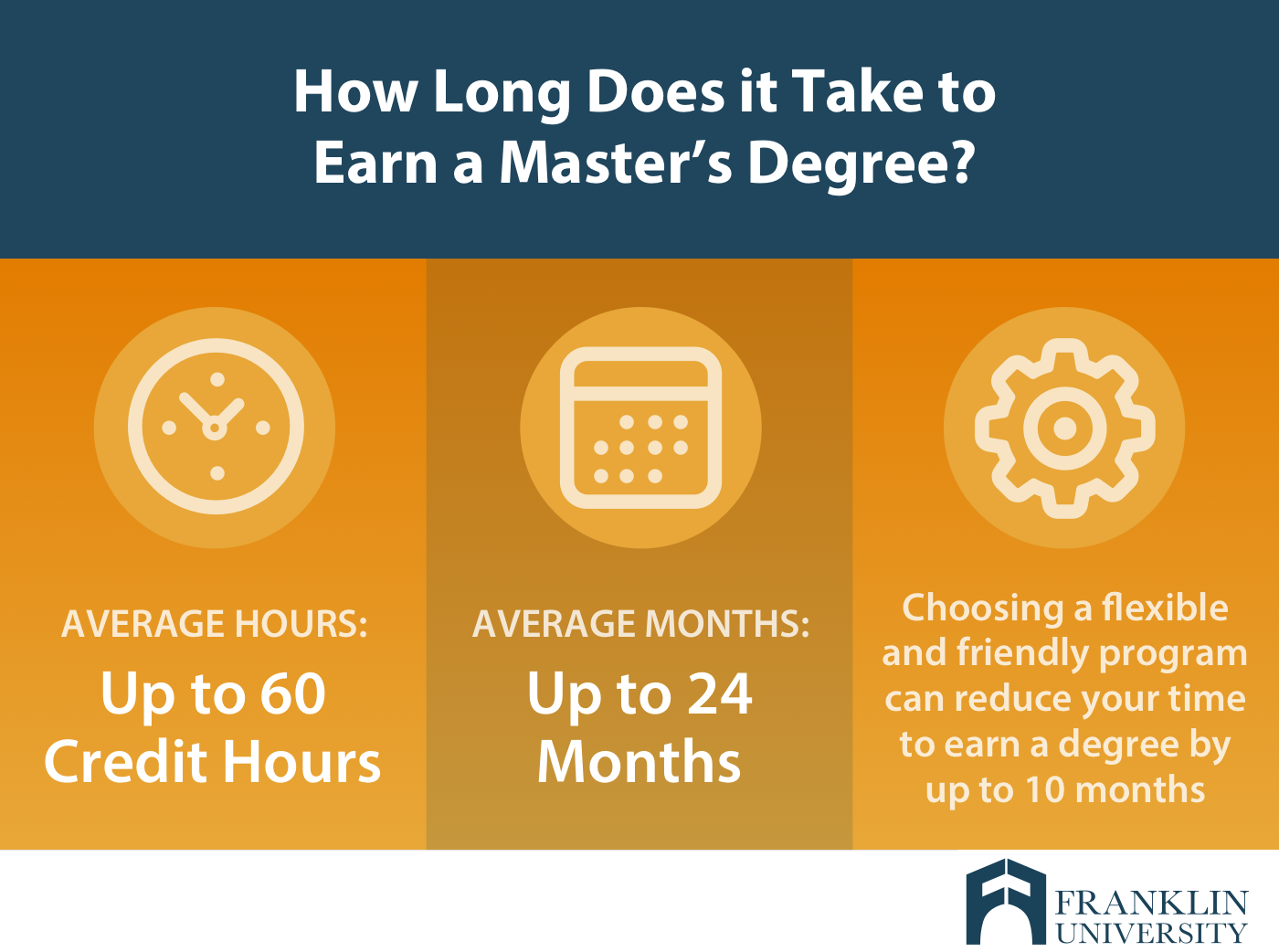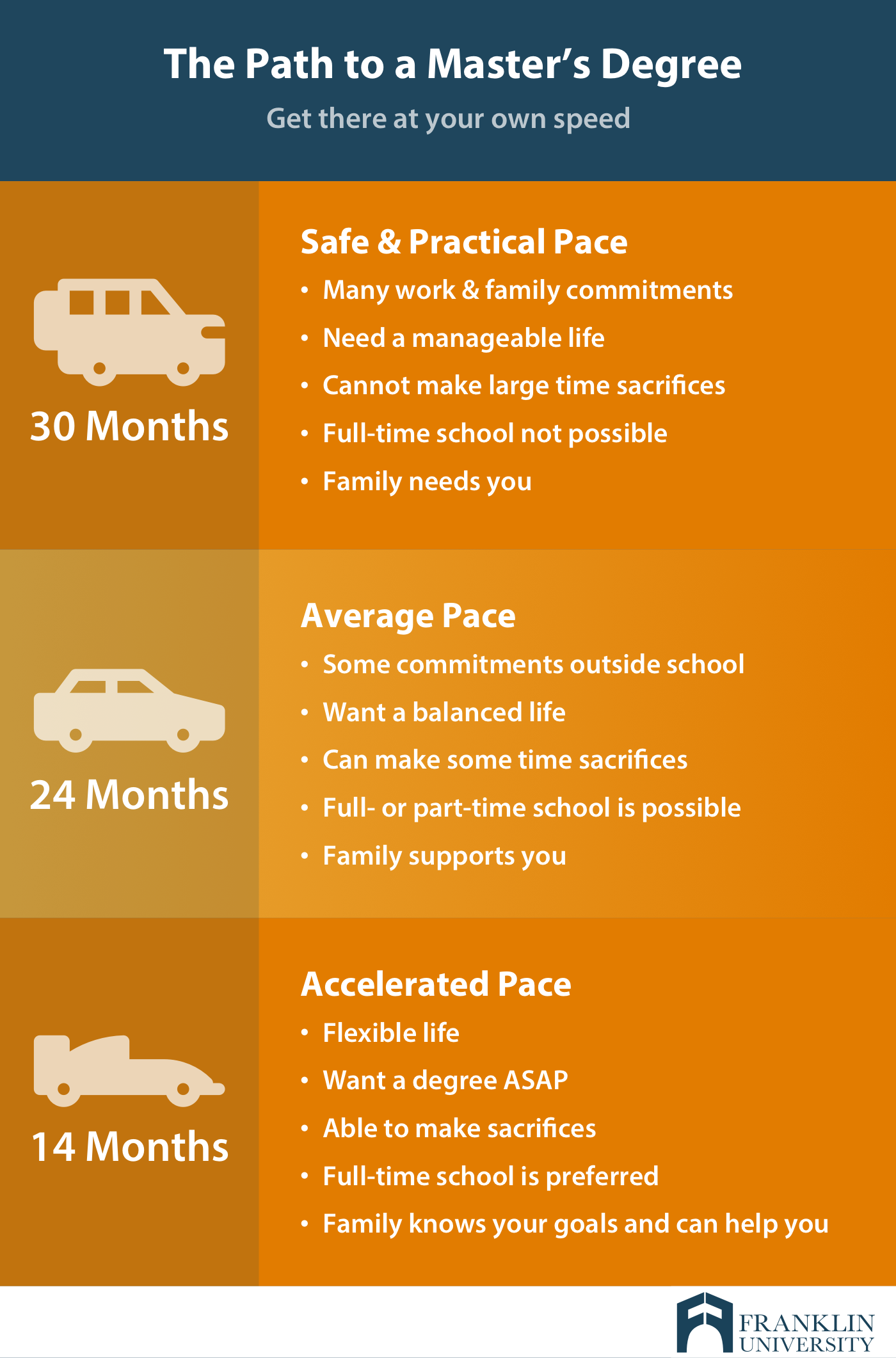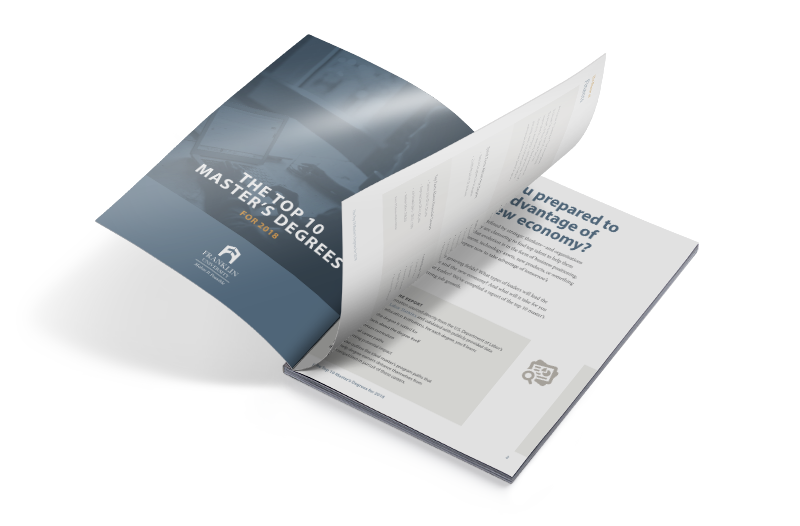Request Information
We're Sorry
There was an unexpected error with the form (your web browser was unable to retrieve some required data from our servers). This kind of error may occur if you have temporarily lost your internet connection. If you're able to verify that your internet connection is stable and the error persists, the Franklin University Help Desk is available to assist you at helpdesk@franklin.edu, 614.947.6682 (local), or 1.866.435.7006 (toll free).
Just a moment while we process your submission.

How Long Does It Take to Get a Master’s Degree?
"How long is this going to take?" That’s one of the most common questions people have when they are thinking about getting a grad degree. Disrupting your life for a few months is one thing, while an unexpectedly long slog is quite another. The key is to know and to plan.
Below are some insights on what to expect as you begin your graduate school efforts, with the goal of helping you manage your time and your mental well-being in the process. The most important thing to remember is that—whether you want to take it fast or slow—you have options to make grad school work for your life.
The Basic Criteria
How Many Credit Hours Will You Need to Graduate?
Most graduate degree programs are around 40 credit hours to complete.
Any given course will have an assigned value of 3 or 4 credits. Depending on the complexity and prerequisites for the subject of a degree, you will likely need to take around 10 to 15 courses to complete your master’s degree. As you compare schools, consider each program’s specified curricula and the number of credit hours that will be required of you.
How Long Will It Take to Complete Those Credit Hours?
On average, students take about 18 to 24 months to complete a master’s degree.
Some programs are geared so that a full-time student can finish in a little over a year. On the other hand, some students prefer to go at a slower pace and choose to take several years to complete their studies.

What’s normal? Well, that really depends on what works for you, according to George Pomeroy, graduate admissions advisor at Franklin University. “Most people want to move quickly. They just want to get their degree done, and that’s typically due to a specific driver like a promotion or a career opportunity. Those students are looking for programs that enable them to get in and get out, so they can get to that opportunity.”
What matters most when choosing a master’s program? Compare features, benefits and cost to find the right school for you.
Factors That Define the Time You’ll Need
There are many ways you can influence the total amount of time it takes to complete your master’s degree. The timeline is within your control.
Full Time vs Part Time
Of course, the biggest impact on your time to completion will be how quickly you choose to take your coursework. Most graduate students are already in the working world—many with jobs, families, and a variety of commitments outside of school. As such, they may find a full-time school workload to be too challenging.
If that sounds like you, know there are plenty of opportunities to take graduate programs at a part-time pace. In fact, some schools have programs especially geared toward working adults.

You’ll find many formats available for you to take your coursework: online, classroom only, and even hybrid classrooms, with students attending both in-person and online. Consider these options as ways you can actively manage the time you spend in the classroom, in the car, and in your own home.
Sometimes, it’s important to focus less on what you need to do and more on what you want to do. Make it feel as though you have some choice in the matter! How do you best learn: full or part-time? What is your preference as a student: getting in-person attention or logging in online? How fast or slow do you want to tackle each challenging subject?
You’ll find that most master’s programs can be tailored to your preferences.
Transfer Credits
Transfer credit can be a time saver in the course of earning a graduate degree.
If you’ve already taken a graduate level course at a different school, any applicable credit may help shorten the time you spend on your current degree. Although some master’s programs do not accept other coursework in transfer, other schools have more accepting policies.
The best thing to do is ask an admissions advisor.
Scheduling Options
Some graduate programs have little choice in terms of scheduling, while others provide more flexibility and options.
Semesters, trimesters, evening lectures, and weekday assignments will all have their pros and cons when it comes to fitting into your life. Some graduate programs can help you complete coursework in less time. “For example,” said Pomeroy, “we have an accelerated course schedule available where a student can start and finish a class in just 6 weeks. Using this schedule, a student can complete two courses in a 12-week period, essentially full-time. But they’re doing it by focusing on just one course at a time. For some people, this is an appealing way to complete a degree with both focus and speed.”
Program Requirements
Depending on the selected degree and the program of choice, a graduate program may require students to meet additional requirements.
Sometimes, a person will need to achieve certain prerequisite coursework before they can begin their master’s studies. Accounting and computer science, for example, typically have prerequisites that must be completed, and that will add on to the time it takes to get your degree. The important thing is to understand these needs in advance so you can plan for them in terms of time and cost.
Major Life Events
Whether you’re in school or not, life will throw things your way. There might be challenges with your job, home, kids, aging parents, or your personal health. When something difficult happens, it can be hard to keep juggling everything.
Examples may include:
- Planned Events: It might be a wedding and honeymoon. Maybe you are planning a move into a new home or your family is finally taking that European vacation.
- Unplanned Events: Perhaps a parent has a sudden health issue and needs assistance or there may be a death in the family.
- Changes in Work/Life Balance: You may have a work-related opportunity that involves extensive travel.
In any case, most master’s programs will enable to you to stop for a while and come back to where you left off. It’ll add more time onto the total required to get your degree, but taking a break might be the only way for you to manage such an extremely busy moment in your life.
In those times, Pomeroy says, the students who succeed are the students who are motivated by something real, something that matters deeply. “Understand what is motivating you. Is it a job that’s pushing you? Is it a career change so you can have stability? If you deeply understand why you’re getting this degree, that will enable you to dig down deep when things get hard.”
Tips to Complete your Degree Faster Than Average
If you want to push the accelerator on earning your degree, that’s fine. But you should keep a few tips in mind so you can move forward with the best chance for success.
Get Better at Time Management
On average, students in a master’s program are in their early-30s. That means that most will know themselves and their time management habits pretty well. If time management is not a strength for you, then you’ll need to figure out a study system that works for you. Graduate school time commitments can be massive and overwhelming. Use apps, calendars, study partners, and other ideas to help you stay on track. Without good time management skills, it’ll be next to impossible to finish your degree quickly.
Know Your Learning Style
If you want to move quickly to complete your degree, put yourself into the learning conditions that serve you best.
- Do you like to learn by interactive lecture or by solo reading?
- Do you process information best via listening, watching, taking notes, group studying, or tutoring?
- Are you a fast learner, or do you do better when you take more time?
- Are you a good multi-tasker, or, do you prefer to focus on one thing at a time?
- Do you prefer an in-person class experience, or would you rather go at your own pace online?
- Knowing what works for you—and, in turn, choosing the right program—will help you to thrive.
Do the Work; Put in the Time
Graduate programs are different than undergraduate studies, partly because of the sheer volume and intensity of work involved. It’s not possible to get too far behind and catch up. If you want to finish your degree in good time, you need to be ready to put in the work and stay current on your coursework.
Whether you’re in the fast lane or the slow lane, the important thing is that you’re going in the right direction. With some smart planning, you can find all the best ways to finish your degree in the time that suits you.





